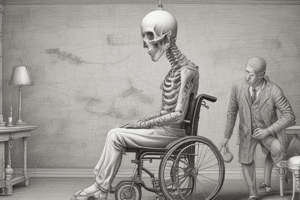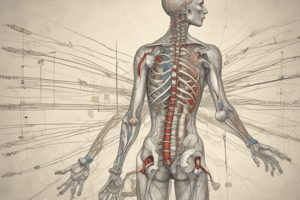Podcast
Questions and Answers
Which syndrome is characterized by upper extremity weakness and 'cape-like' loss of pain and temperature sensation?
Which syndrome is characterized by upper extremity weakness and 'cape-like' loss of pain and temperature sensation?
- Anterior Cord Syndrome
- Central Cord Syndrome (correct)
- Brown Sequard Syndrome
- Medial Medullary Syndrome
What type of injury is most commonly associated with Anterior Cord Syndrome?
What type of injury is most commonly associated with Anterior Cord Syndrome?
- Neck hyperextension
- Head trauma
- Spinal compression
- Neck flexion (correct)
Which of the following correctly describes Brown Sequard Syndrome?
Which of the following correctly describes Brown Sequard Syndrome?
- Loss of proprioception with no effect on pain sensation
- Bilateral motor weakness and sensory loss
- Ipsilateral loss of pain sensation and contralateral loss of motor function
- Ipsilateral loss of motor function and contralateral loss of pain sensation (correct)
Medial medullary syndrome primarily results from which of the following?
Medial medullary syndrome primarily results from which of the following?
Which symptom is most characteristic of Central Cord Syndrome in clinical presentation?
Which symptom is most characteristic of Central Cord Syndrome in clinical presentation?
Flashcards are hidden until you start studying
Study Notes
Spinal Cord Syndromes
Central Cord Syndrome
- Typically occurs with neck hyperextension in adults over 50
- Presents with:
- Pronounced upper extremity weakness
- "Cape-like" loss of pain and temperature sensation
- Damage to ventral horn and spinothalamic tracts at the cervical spine level
Anterior Cord Syndrome
- Commonly associated with neck flexion injuries
- Results in damage to:
- Corticospinal tracts
- Spinothalamic tracts
- Presents with:
- Pronounced lower extremity symptoms
- Upper motor neuron signs below the level of the lesion
Brown Sequard Syndrome
- Characterized by:
- Ipsilateral loss of motor function
- Ipsilateral loss of medium to large sensory fibers (vibration, proprioception, fine touch)
- Contralateral loss of pain and temperature
Medial Medullary Syndrome
- Typically results from a stroke
- Presents with:
- Weakness in the tongue (cranial nerve XII)
- Hemiplegia
Studying That Suits You
Use AI to generate personalized quizzes and flashcards to suit your learning preferences.



